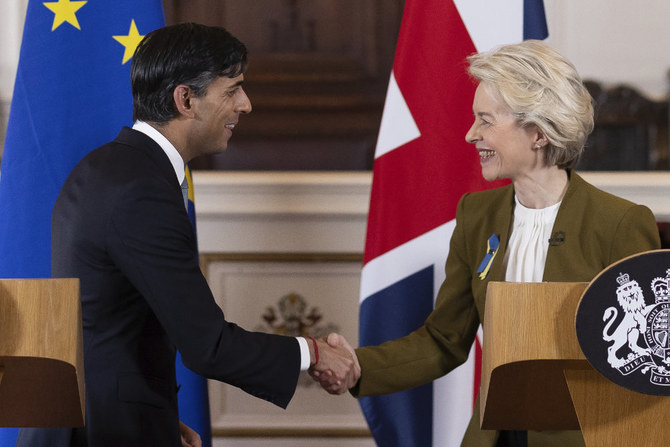Mohamed Chebaro
The Brexit saga has again and again been the absolute disruptor of British life since 2016. Despite the many excuses, it is increasingly clear that the process that has divided the country has hurt Britain, the UK economy and the standing of this leading union in Europe and the world. It is maybe a relief to see the breakthrough announced this week that might open a new chapter in UK-EU relations after years of Brexit tensions.
Brussels and London have agreed to set aside their differences over the Northern Ireland protocol and come up with a sweeping overhaul of trade rules in Northern Ireland. The deal was cheered by most in the UK and on the continent, as well as across the Atlantic in the US, as the Biden administration is determined to ensure no damage is done to the 1998 Good Friday Agreement that brought peace to Northern Ireland after 30 years of violence. But a few in the Conservative Party’s hard-line wing remain, it seems, bent on spoiling the party.
Former Prime Minister Boris Johnson has apparently warned Northern Ireland’s Democratic Unionist Party to be cautious about the deal that could facilitate the flow of goods between the UK mainland and Northern Ireland without infringing on the EU customs arrangement introduced after Brexit. The anti-EU voices in the UK remain strong, but their impact is surely waning in the face of new realities in the weakened post-Brexit British economy. The Ukraine war has made all Western countries rethink their primary interests, compared to those interests conceived in the pre-Brexit referendum era.
This was reflected in a recent poll conducted by Savanta for The Independent, which revealed that almost two in every three Britons believe that Brexit has damaged the UK’s economy. According to the same survey, 61 percent of voters believe that quitting the EU has made Britain’s economy worse, with only 13 percent claiming Brexit has improved the economic situation of the country. Nearly 50 percent of respondents said Brexit had negatively affected their personal finances. Many Leavers have also been coming to the conclusion that they were mis-sold Brexit. And there is skepticism about the mantra of “taking back control,” as 44 percent of respondents said Brexit had made immigration worse. A report by Durham University last month concluded that the Brexit deal is a primary factor in the small boat crisis, as the UK leadership left the EU without a returns agreement in place, leading to a skyrocketing increase in the number of English Channel crossings.
Pressured by the polls and the changing public attitude toward Brexit, a cross-party summit was convened last month at a private retreat. It aimed to discuss “How can we make Brexit work better with our neighbors in Europe?” Clearly, such an event, attended by both Leavers and Remainers, points to the realization that something needs to be done to lift the country from its clear descent toward economic catastrophe. It was, therefore, not a surprise to hear some experts – the same ones whose warnings were swept aside by Brexiteers ahead of the referendum in 2016 – say that, unless action is taken, Britain’s economic growth is destined to retreat to second-last among the G20 countries this year, ahead of only Russia. A Labour Party expert analysis has also forecast that Britons are likely to become poorer than people in Poland, Hungary and Romania in the coming years.
All the above points to one thing, and that is the need for the UK leadership, regardless of the party they represent, to face reality and address the elephant in the room, as it is always possible for the country to change course. Britain’s traditions, customs and laws have always been agile and able to adapt to the changing circumstances of both the country and the world. The vision, though full of holes, to leave the EU, which was sold to the people in 2016, might have been the result of a foresightedness that did not materialize. It is normal, therefore, to reopen the debate about Brexit and reverse it, if the national interest of the country requires it, before it is too late and if the EU would agree to readmit the UK. Europe has divided Britain, and particularly the Conservative Party, since the 1950s. Initially, the Tories opposed the European Economic Community, but then they changed their mind to become the party of Europe in the 1970s and 1980s. Later, the Conservatives became more and more euroskeptic, ultimately leading to the disaster of Brexit that we have been watching unravel since 2016.







